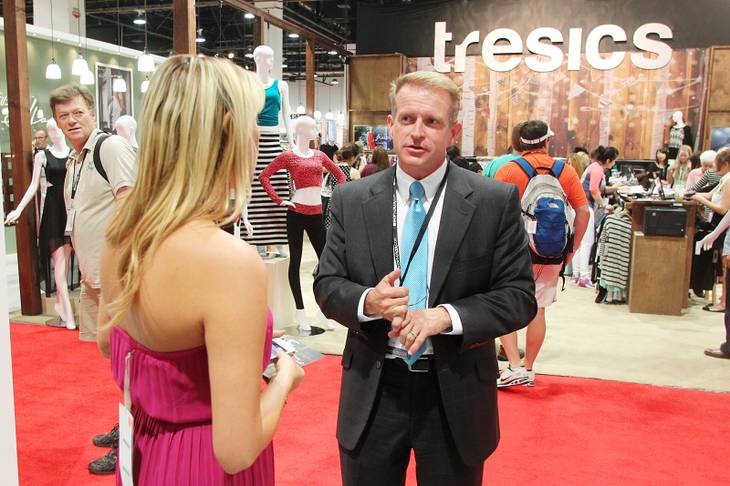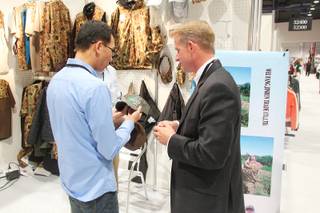VEGAS INC coverage
Usually, when F. Christopher Austin walks the aisles of the city’s convention centers, he’s a man on a mission, looking for counterfeit property and preparing for the fireworks that typically erupt when his team confiscates goods.
Austin makes a living building copyright and patent infringement cases against companies that duplicate protected products and sell them as their own at local conventions.
He works on an extremely tight deadline. After gathering pictures, statements and brochures from aggrieved companies, Austin has only about 30 hours to persuade a federal judge to issue a restraining order, allow police to haul away the goods and serve the offending company’s executives court papers before the convention ends.
This week, however, Austin, an intellectual property attorney with Kolesar & Leatham, is at MAGIC Market Week, a massive fashion trade show at the Las Vegas Convention Center, to teach people about what’s at stake when their products are copied.
The value of counterfeit goods is expected to exceed $1.7 trillion globally by 2015 — more than 2 percent of the world’s total economic output, according to International Chamber of Commerce estimates. Most counterfeiting occurs in the fashion and accessories markets, which is why Austin attended MAGIC. The three-day trade show, which ended Wednesday, drew an estimated 80,000 people.
Austin zeroes in on a suspected knock-off less than five minutes after stepping onto the show floor. It's a hat with an American Eagle logo, including a registered trademark symbol. Vendors at the booth say they can quickly deliver thousands of them to retailers.
“Do you have a license to use these trademarks?” Austin asks.
Representatives of the Chinese business can't understand or choose not to respond to Austin's question.
Chinese companies frequently knock off American products, Austin says. He’s convinced that if more American companies knew how much revenue is at stake and how relatively easy the process of bringing a claim against a counterfeiter is, more would take that step. Most companies assume it’s a long, drawn-out legal process when in fact it typically takes only a few days.
With the average trade show lasting three or four days, “by the time you went through a drawn-out legal process, the offending company would be gone," said Austin, a former military judge advocate general in the Air Force. "They’d be back to China or some other country. They’d be untouchable, and you couldn’t serve them. You couldn’t initiate a process against them, and whatever damage they’ve caused is already done and you may not know about it. They may well have contracted with a major retailer, and the manufacturing company won’t know any different.”
Austin is one of a handful of Las Vegas attorneys equipped to pursue such cases. Most studied with respected intellectual property attorney Mark Tratos. With more than 20,000 conventions a year, Las Vegas is a perfect location for a trademark lawyer.
Austin generally pursues civil remedies, which have a lower burden of proof than criminal actions. He has had several recent successes.
On the first day of the National Hardware Show in May, Austin received a call from executives at Bond Manufacturing in California, which produces outdoor heat lamps and fire pits for patios. Bond had used a Chinese company to manufacture its merchandise but severed ties with the factory.
Bond officials realized something was amiss when they arrived in Las Vegas for the hardware show and saw Bond boxes on the floor. Bond didn’t have a booth at the convention.
The executives suspected the Chinese company was trying to take orders and sell Bond products under its own name. Austin had fewer than three days to make a move.
“In a case like this, we’ll work 20 hours straight to get ready,” Austin said. “The members of my team know that this takes precedence, and we gear up to pay some overtime.”
Austin schedules an appearance before a judge and notifies show operators and security that he’s planning to serve a court order to a vendor. He also arranges for law enforcement, usually U.S. marshals, Metro Police or the Clark County constable’s office, to accompany him.
“There’s a bit of a challenge in making sure you get that right because you only get one shot at it,” Austin said.
Austin also has to line up storage for confiscated goods and prepare a chain of custody log to account for every piece of property taken.
In his appearance before the judge, which usually takes place in an office rather than in open court, Austin must present a persuasive argument.
“The judge asks a whole bunch of good questions because he wants to make sure we’ve complied with each of the statutory requirements ... because I’m taking somebody’s property without giving them a chance to talk about it or defend their case,” he said.
Once a temporary injunction is signed, the real fun begins.
“That’s when we join up with law enforcement and we run down there and serve the other side and seize the stuff," he said. "That’s when it feels like you’re suddenly part of a SWAT team.”
In the Bond case, Austin asked the company to turn over the property voluntarily. A manager tore up the letter, Austin said.
Austin and his team removed the counterfeit heaters and fire pits from the booth and served the company with a notice to appear in court. Representatives failed to show up, and Bond won a default judgment.
In another case, Austin worked with Briggs & Stratton, a lawn mower manufacturing company, to bring a complaint against a company that duplicated Briggs & Stratton's engine housing, even down to its bright red color. The only thing missing was the Briggs & Stratton logo.
“I had an associate wheeling out one of the lawn mowers after we went in and as he was wheeling it out, one of the wheels literally fell off the mower,” Austin said. “People were saying, ‘Wow, clearly a knockoff.’”
Cases can cost clients anywhere from $10,000 to $30,000. But considering that companies could lose millions of dollars if knockoffs go unchecked, Austin's services can be a wise investment.
Briggs & Stratton now has an executive whose only job is to stop counterfeiting.
Austin says he enjoys the confiscation part of his job the most. It provides an adrenaline rush most attorneys never experience.
Sometimes the action can get intense.
“One guy, as we were serving him, decided to bolt,” Austin said. “The instinctive reaction of the marshal who was with me at the time was to stop him. We were at a café in the Venetian — public, right out there among the tables and chairs. It was like he was parting the Red Sea. He just grabbed one table, and it flies across the room, and he went right through and cut the guy off by plowing through all the tables in the way. He tackled him and handed him the papers and said, ‘You’re served.’ That was the coolest.”

